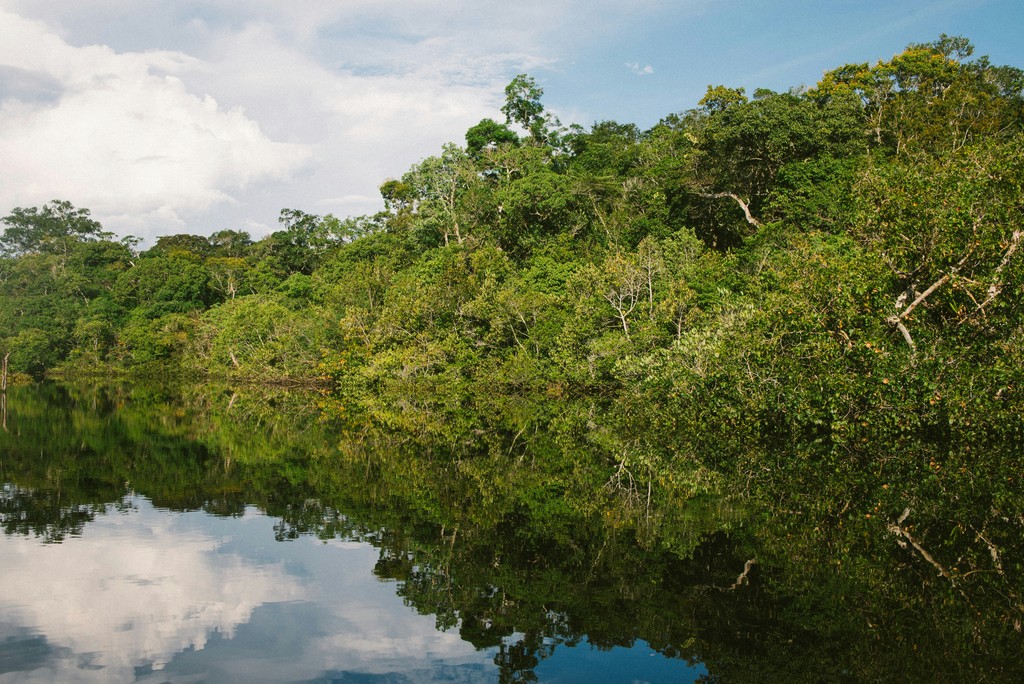Compilation of Climate Justice Advocacy
Good Practices of Local to Global Action

Overview
PROJECT DURATION
September 2021 to May 2022 and September 2022 to May 2023
BUDGET AND FUNDING
USD 52,000 The Lutheran World Federation, Evangelical Lutheran Church in America - ELCA Hunger, individual congregations and donors.
SNAPSHOT
The Climate Justice and Faith Certificate initiative is designed to address adaptation, mitigation, and climate justice advocacy. This program is a collaborative effort between the LWF and the Pacific Lutheran Theological Seminary. It offers an online course on climate justice and faith, catering to individuals affiliated with the LWF member churches, regardless of whether they hold lay or ordained positions.
IMPLEMENTATION
Pacific Lutheran Theological Seminary
What sets this project apart is its approach to training students in climate-related matters, equipping them with the necessary tools and support.
The distinctive aspect and relevance lie in empowering these students to take charge and implement projects that tackle adaptation, mitigation, and climate justice advocacy initiatives within their respective communities.
This program is a collaborative effort between the LWF and the Pacific Lutheran Theological Seminary. It offers an online course on climate justice and faith, catering to individuals affiliated with the LWF member churches, regardless of whether they hold lay or ordained positions.
The program’s total cost per student amounts to USD 600, yet it is noteworthy that financial assistance is commonly provided by the Center for Climate Justice and Faith. In 2022-23 USD 21,000 in scholarships were granted.
Spanning over eight months, the course comprises weekly online classes with various tasks that include readings, active participation in a chat board, written assignments, and the presentation of a final project proposal for implementation within their communities.
Upon successful completion of the non-degree study program, participants are granted a Certificate in Climate Justice and Faith, accredited by California Lutheran University.
This certificate program utilized an online, cohort-based, and trans-continental approach, empowering participants to develop ethical, spiritual, and practical leadership abilities in the field of climate justice within faith-based communities and through collaborative efforts with others.
Context
The project’s online nature enabled individuals in 26 countries, and five continents to participate in the certificate program, thereby enriching the scope of its discussions and global impact.
After the successful implementation of the first two courses in English, the project has been expanded to encompass Spanish-speaking people in Latin America and the Caribbean (LAC), and North America, with three facilitators from the LAC region.
The LWF partners for this program are the Pacific Lutheran Theological Seminary, the Augsburg Lutheran Seminary in Mexico, the Salvadoran Lutheran University in El Salvador, and the Institute for Contextual Pastoral Ministry in Argentina and Uruguay.

Strategies
Community education, sensitization and capacity-strengthening for adaptation and resilience and a solid network
The project originates as a joint initiative between the Pacific Lutheran Theological Seminary, the Evangelical Lutheran Church in America (ELCA) World Hunger, and the LWF.
This solid network has ensured its program sustainability and positioned the seminary as a leading authority in matters concerning climate justice. Furthermore, as an integral part of its networking strategy, the seminary has forged strong bonds with both former and current students, and through them, with their respective communities.
Community education, awareness raising, and capacity-strengthening
As a component of their coursework, students are encouraged to develop and implement projects that address the pressing issue of climate change within their communities. This not only ensures the sustainability of the initiative and amplifies its impact, but also emphasizes the utmost importance of inclusivity and thoughtful consideration of local communities, particularly the most vulnerable. Solutions are devised from a local perspective, considering their uniqueness and people’s needs. This approach has placed great emphasis on local decision-making and the practical application of the Local to Global to Local approach.
Throughout the eight-month course, students undergo educational instruction and engage in discussions on climate-related topics. The curriculum links the theological basis of care for creation to knowledge about climate. The primary learning objectives encompass recognizing and addressing the intersections between climate change and disparities based on race, economy, and gender.
The curriculum covers various subjects such as theology, ethics, and spirituality pertaining to climate justice, climate change knowledge, and social change methodologies linking ecological well-being to racial, economic, gender justice, and other topics discussed at the United Nations Framework Convention on Climate Change as well as how to advocate at a national, regional, and global level.
The project employs a multiplier approach, requiring primary participants to disseminate their knowledge and implement a project within their respective local communities.
Advocacy
The distinctiveness of the advocacy activities lies in their execution, which involves not only project implementation through its channels but also the active engagement of the attendees and their communities. This approach enables the project to extend its influence beyond borders and achieve a more profound impact at the local level.
Shede Habila earned a certificate from the Pacific Lutheran Theological Seminary Center for Climate Justice and Faith in 2022. He is leading a reforestation initiative in his community in Yola, Nigeria. As a member of the Lutheran Church of Christ of Nigeria, Habila has seen the impacts of the climate crisis firsthand and understands the urgency of solving it.
“We are here to push and advocate for the governments to put more effort into addressing the global climate crisis… The right time to act is now,” said Shede Habila.
Anania Ndondole from the Evangelical Lutheran Church in Tanzania completed the Certificate in Climate Justice and Faith at the same time as Shede Habila, and now leads climate justice work in his church. “Young people must raise their voices for climate justice and a future on this planet. Young people must be ambassadors of change,” said Ndondole.
This program offers a comprehensive online curriculum designed to foster a trans-contextual cohort-based learning experience.
“It will not only broaden participants’ knowledge but deepen their experience of the global nature of climate justice efforts. Participants will explore their understanding of what it means to lead the climate justice work of congregations and groups within their context. They will also deepen their spirituality of climate justice work so that they are equipped to effectively lead others.” (Rev. Dr. Chad Rimmer, LWF Program Executive for Theology)
The program introduces learners to a wide range of international reports and scientific resources concerning climate change. Furthermore, it encourages dialogue with interfaith and local partners actively involved in climate justice initiatives.
Subsequently, students are tasked with developing projects aimed at creating tangible and meaningful impacts within their communities and beyond.
“Because of my project, I was able to organize a climate course in the school I teach. They really understood what climate change is and what it means to love and care about the environment. We encourage my community to take care of the environment. What I see in my project is that my community could see what it means to love what God has created.” (Sabi Elizabeth Aitiya, Graduate)
Participating students remain well-informed about ongoing global discussions, reports, and scientific advancements related to climate change. By applying this knowledge to their projects, they contribute to fostering enduring positive change within their respective communities.

Target Group
The primary educational objectives encompass the identification and resolution of the interconnections between climate change and disparities based on race, economics, and gender. Throughout the course, numerous discussions have been conducted concerning the disproportionate implications of climate change on gender and youth. Cases, like the one of Sabi Elizabeth Aititya mentioned above, create a huge impact in their communities and provide women the possibility to become local leaders. “Her story was published in local press twice as a woman of faith speaking out graciously and powerfully about this challenge as a critical movement to living out our vocation as followers of Christ.”
For potential participants, this program offers a valuable opportunity to explore faith-based climate justice initiatives in their own contexts. It is designed for individuals seeking spiritual insights to support their climate action efforts. This accessible, non-degree program is conducted entirely online via Zoom and interactive digital platforms. Applicants from communities disproportionately affected by climate change and from LWF member churches are especially encouraged to apply.
The application is open to everyone, with a particular emphasis on individuals who hold leadership positions or aspire to become leaders within their congregations. The program centers around Christian perspectives and encourages participants to engage in ecumenical discussions based on relevant texts. Selection criteria for the course includes strong connection with local communities, eagerness to implement learning, and demonstrated commitment to completing a final project.
The following are the course requirements for participants: Two to 4 hours of independent work per week for each 15-week semester. Engagement in 90 minutes of scheduled Zoom meetings with their cohort every month throughout the academic year, periodically taking on facilitator roles. Participation and collaboration with local initiatives, congregations, and/or groups (especially by the springfirst semester) to ensure context-based practice of the concepts discussed in the secondfall semester. Willingness to take on the work of climate justice as a spiritual practice within their spheres of influence.
The first course took place from September 2021 until May 2022, during which 25 participants successfully completed their studies. Subsequently, the second course was conducted from September 2022 until May 2023, resulting in the graduation of 22 students out of a total cohort of 40. Preparations are underway for the commencement of a third English course.

Impact
1.
Graduates and participants are prepared to cultivate moral, spiritual, and practical power for the work of climate justice in communities of faith and in collaboration with others.
2.
Participants are more prepared to tackle climate change and have participated in climate change negotiations at a national and global level.
3.
Graduates recognize and address intersections of climate change with racial, economic, and gender-based inequity, and intersections of ecological well-being with racial, economic, and gender justice.
4.
Congregations, synods, and dioceses are better equipped to fulfill their baptismal vocation to “seek justice and peace in all Earth” in the face of climate crises intertwined with issues of racial and economic injustice.
5.
The Pacific Lutheran Theological Seminary is at the forefront of faith-based work for environmental justice and creation care. It serves as a powerful witness to the world, demonstrating that the church is relevant, justice-seeking, creation-caring, and empowering.
6.
As part of the curricula, the students designed and implemented different projects that addressed adaptation, mitigation, and/or advocacy in their respective communities, owning the problem and multiplying the project’s impact.

Replicability
In the second course, there were a total of 40 registrations. Twenty-two students graduated, representing a completion rate of 55%.
“Our primary focus is currently directed toward enhancing student retention, which has presented some challenges, particularly with regard to students based in African countries facing difficulties accessing the Internet. To address this issue, during the second year, we took the initiative of providing financial assistance for Internet access or data cards, which proved beneficial for certain students.
Language proficiency has also emerged as a significant barrier. As a response, we have introduced courses in Spanish. This way, we aim to ensure a more inclusive and accessible learning environment. Additionally, we have implemented stricter language proficiency requirements for participants, to ensure a higher completion rate.
Furthermore, it came to our attention that many students lacked the necessary funds to implement the projects proposed in the course. To support them in realizing their ideas, we began offering grants specifically dedicated to project implementation.” (Sarah Berg, Director, Centre for Climate Justice and Faith)
In summary, the current efforts revolve around evaluating methods to enhance student retention. This may entail increasing the availability of grant funding or fostering stronger connections between students and their local communities.
One idea under consideration is to require a letter of recommendation from a local faith-based organization, as such endorsements could potentially heighten the students’ sense of accountability and commitment to the program.






